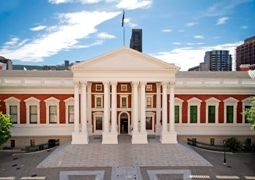
The National Council of Provinces (NCOP) marked Heritage Month at the beginning of September with a debate on United in our diversity and rich cultural heritage: The path to constructing a non-racial, non-sexist, united and prosperous democratic society.
The discussion was opened by the Minister of Sport, Arts and Culture Mr Nathi Mthethwa, with a reminder that the African Union (AU) has recognised the role arts, culture and heritage can play as catalysts for the socio-economic development and integration of the African continent. The year 2021 has also been declared by the AU as “The year for Arts, Culture and Heritage: Levers for Building the Africa we want”.
“Arts and culture are two sides of the same coin,” Mr Mthethwa said. “The former constitutes the artistic and collective production reflecting the cultural reality of a society, whereas the latter moors the society and constitutes the basis on which social and heritage capital is formed. Together arts and culture are part and parcel of heritage of a country.”
Minister Mthethwa outlined a number of initiatives his department will be embarking upon to celebrate heritage. These include the Africa Cultural Seasons aimed at promoting regional integration and support efforts towards expanded trade of cultural goods and services in the continent, and the promotion of the use of African Languages.
“The focus on Indigenous languages in particular provides an opportunity to showcase and promote African languages and cultures across the continent of Africa,” he said.
NCOP Permanent Delegate and Chairperson of the Select Committee on Education, Technology, Sports, Arts and Culture Mr Elleck Nchabeleng participated in the debate with a strong emphasis on the importance of developing and promoting indigenous languages.
He described heritage as a critical aspect which holds the identity and history of a people. He also mentioned that colonialism and apartheid have significantly impacted on Africa and South Africa. “Colonialism disregarded our indigenous culture and ensured that their own culture was reinforced in order to erode our identity. This was done to perpetually position our languages and culture as that of second class citizens and not worthy to be languages of learning, business and communication,” argued Mr Nchabeleng.
He also called on parents to ensure that teach children their indigenous languages, saying it is important that all children know their nation’s heritage, cultures and history in order to restore their identity. “Today Africa is polarised politically, economically and socially on the basis of language, which stems from the colonial origin. Hence nations in Africa are also categorised as Anglophone, Francophone. We cannot undo history, but we can restore our African identity and empower our own cultures,” Mr Nchabeleng said.
Another aspect of colonialism is the theft of indigenous knowledge and intellectual property, he said. The current coronavirus also brought to the fore critical issues around indigenous knowledge – particularly with medicinal knowledge.
He told the virtual sitting of the NCOP that some of the symptoms of the coronavirus can be treated or mitigated through use of various plants, which Africans have been using for centuries, and some of which are used in the manufacturing of Western medicine.
He said the limitation in mainstreaming indigenous medicine is also due to the lack of systems to test and certify these medicinal plants, which many South Africans still use. “Systems and quality assurance are critical to create public awareness and to share the positive aspects of such plants, whilst also reducing the risk and side effects resulting from the use if such remedies.
“Indigenous knowledge cuts across economic and social aspects. However, due to the unregulated nature of indigenous knowledge system our heritage and intellectual property are not protected, resulting in others exploiting such knowledge,” said the committee Chairperson.
He also welcomed the existence of the Indigenous Knowledge Systems Act, which the Department of Science and Innovation is implementing in order to promote the economic, social and political development in indigenous knowledge.
Another NCOP delegate, Mr Mbulelo Bara, lamented the state of South Africa’s heritage sites, mentioning the “imminent closure of Lilieslief Farm and the Mandela house in Vilakazi Street (Soweto)” as a failure of government to preserve our heritage.
NCOP Member Mr Stephanus du Toit called on South Africans to respect each other’s “cultures, beliefs, religion, language and ethnicity”.
Sakhile Mokoena
6 September 2021

